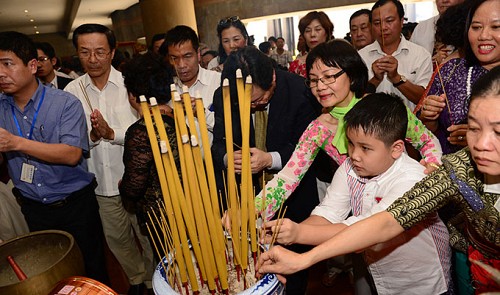Overseas Vietnamese wish to contribute to fatherland’s development

Many of these returnees have told Tuoi Tre (Youth) newspaper about their feelings and ambitions.
‘Where you are’ less important than ‘what you do’
Vietnam has achieved much since reunification in 1975, but the country still has much to do in comparison to other countries, said Nguyen Tri Dung, who is Vietnamese-Japanese.
He emphasized that the future of Vietnam will be determined by the efforts of each Vietnamese person.
Abroad, many OVs, including students, often wonder, “Should we return home to contribute to the country’s development?”
At home, the Vietnamese government has rolled out the red carpet for OV investors.
But in fact, where a person lives is not more important than what they can do for the homeland, no matter whether they are inside or outside Vietnam, Dung said.
Unite to protect sovereignty
Dinh Kim Nguyet, a Vietnamese woman who has settled in Canada, said, “We regularly get information related to the country's sovereignty and are united with people in the homeland to struggle for the protection of sovereignty.”
In 2014, after hearing that China illegally placed its Haiyang Shiyou 981 drilling rig in waters under the sovereignty of Vietnam from May to July, Vietnamese expatriates in Canada clearly expressed their support for safeguarding the nation’s sovereignty.
“We also raised money among the Vietnamese communities and sent the donations home as support for the country in the struggle to protect territorial sovereignty,” Nguyet said.
Most Vietnamese in Canada are usually ready to support fundraising campaigns or other activities with the theme of “Toward the Homeland,” she added.
Vietnam is main export market
“I was born and grew up in Thailand, but I always remember I am Vietnamese, and it is this feeling that has prompted me to choose Vietnam as the market for my business,” Le Van Trong, a Vietnamese-Thai businessman, said.
“I have chosen Vietnam as the main export market for my tires and tubes,” Trong said. “Currently, my company’s export turnover from Vietnam amounts to US$6-7 million per year, the highest compared to all other markets, including Laos, Cambodia and the Middle East.”
Trong said he has recently acted as a bridge for at least three Thai business groups from the Thai province of Chaiyaphum to contact potential Vietnamese partners.
He also said he and other Thai businessmen often seek business opportunities in central Vietnamese provinces, where they can arrive from Thailand by crossing through Laos.
Vietnamese communities in Thailand usually take part in campaigns to support Vietnam, such as those for the Truong Sa (Spratly) archipelago, for poor people and for victims of Agent Orange, he added.
OV investors have double advantage in Vietnam
Phan Thanh, a Vietnamese-Canadian man who moved to Canada before 1975, said that when Vietnam applied the open door policy, he was one of the first foreign investors in the country.
“I have invested in shares of the Equatorial Hotel in Ho Chi Minh City for over 20 years,” Thanh said.
While doing business in Vietnam, OV investors have the advantage over others, Thanh commented.
“As we can speak Vietnamese fluently and understand the country’s culture and customs, we can deal with local authorities as well as local partners more easily than investors who are not OVs,” he explained.
“In my opinion, Vietnam has plenty of business opportunities for foreign investors, and I often introduce the positive changes in Vietnam to other OVs and encourage them to invest in the country,” Thanh said.
Looking toward to the fatherland
Over the past year, the Vietnamese Embassy in Russia has provided Vietnamese there with information about Vietnam’s seas and islands, said Tran Phu Thuan, standing deputy chairman of the Vietnamese Association in the European country.
“Many Vietnamese people here followed the developments related to China’s illegal deployment of its oil rig to waters under Vietnam’s sovereignty in the East Vietnam Sea,” Thuan said.
He added that Vietnamese in Russia often remind each other that they must always look toward the fatherland and build a close relationship between overseas Vietnamese and their compatriots in Vietnam.
“When I left Russia for Vietnam to celebrate Tet, my Vietnamese community in Russia tasked me with collecting information about the celebrations in Vietnam as well as the country’s affairs and narrate them to those who have not been able to return to our homeland,” Thuan said.
What the stars mean:
★ Poor ★ ★ Promising ★★★ Good ★★★★ Very good ★★★★★ Exceptional
Latest News
More News
- Congratulations from VFF Central Committee's int’l partners to 14th National Party Congress (January 25, 2026 | 09:46)
- List of newly-elected members of 14th Political Bureau announced (January 23, 2026 | 16:27)
- 14th Party Central Committee unanimously elects To Lam as General Secretary (January 23, 2026 | 16:22)
- List of members of 14th Party Central Committee announced (January 23, 2026 | 09:12)
- Highlights of fourth working day of 14th National Party Congress (January 23, 2026 | 09:06)
- Press provides timely, accurate coverage of 14th National Party Congress (January 22, 2026 | 09:49)
- Press release on second working day of 14th National Party Congress (January 22, 2026 | 09:19)
- Minister sets out key directions to promote intrinsic strength of Vietnamese culture (January 22, 2026 | 09:16)
- 14th National Party Congress: Renewed momentum for OVs to contribute to homeland (January 21, 2026 | 09:49)
- Party Congress building momentum for a new era of national growth (January 20, 2026 | 15:00)
















 Mobile Version
Mobile Version